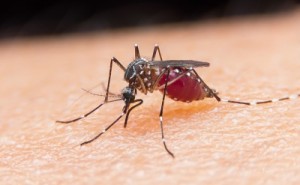Zika, Pregnancy and Birth Defects
By Dr. Amina Ahmed, Levine Children’s Hospital
 Zika virus disease has been front and center in the news this year, but there are still many aspects of the disease – and ways to protect against it – that people may not understand. In some cases, the virus has been associated with Guillain-Barré Syndrome (GBS), a neurological illness that results in temporary muscle weakness or paralysis.
Zika virus disease has been front and center in the news this year, but there are still many aspects of the disease – and ways to protect against it – that people may not understand. In some cases, the virus has been associated with Guillain-Barré Syndrome (GBS), a neurological illness that results in temporary muscle weakness or paralysis.
But of most concern to parents and women of childbearing age is that the virus has been scientifically linked to fetal brain defects that result in congenital microcephaly (which includes such symptoms as an abnormally small head and incomplete brain development). It is still unknown how often the virus is transmitted from the infected pregnant woman to the fetus or how severely the newborn may be affected. Outcomes range from mild delay in development to motor or intellectual deficits or cerebral palsy.
As of May 2016, 195 pregnant women in the United States had laboratory evidence of Zika virus infection. The first case of congenital microcephaly reported in the U.S. occurred in January 2016 in Hawaii in a baby born to a woman who lived in Brazil during pregnancy.
People who have traveled to or lived in areas with transmission of Zika virus are often anxious to be tested. Disease is suspected based on the individual’s symptoms, and a recent history of residence or travel to an area with active transmission of the virus.
For those with these risk factors, infection can be confirmed by laboratory testing of blood or other bodily fluids such as urine. There are two types of tests available: polymerase chain reaction (PCR), which detects the virus, and serology, which detects antibodies (the body’s immune response to the virus). Using guidelines from the Centers for Disease Control and Prevention (CDC) based on the type of exposure and the duration of symptoms, a doctor can determine which test(s) to use for diagnosis. For pregnant women who have traveled to areas with ongoing Zika virus transmission, the CDC recommends testing during the first week of illness. The CDC also recommends testing pregnant women even without symptoms between two to 12 weeks after exposure.
Fortunately, Zika virus infection is usually mild and requires no specific treatment. People with the infection should get plenty of rest, drink fluids and use common medicines such as acetaminophen for fever and pain.
Precaution is key. Those planning travel to areas with Zika virus outbreaks, especially pregnant women and women planning to become pregnant, should check with their doctor regarding the safety of travel. Travel notices are available on the CDC website. It is recommended that women who travel to a country with Zika transmission should not plan to become pregnant for at least eight weeks after leaving. Men who travel to a country with Zika transmission should use condoms or avoid having sex with a pregnant partner. Men should also not have unprotected sex for at least eight weeks after leaving the country, or a full six months if they have symptoms or confirmed infection.
Even if you are not looking to become pregnant, it is important to remember that Zika can still make you very sick. Without an antiviral treatment or vaccine to treat Zika virus, the most critical preventative measure is to protect yourself against mosquito bites when traveling to or residing in areas of active transmission.
Remember:
- Protection is required all day. Wear light-colored clothing that covers as much of the body as possible.
- Use window screens, close doors and windows, and use air conditioning when available.
- Sleep under mosquito nets.
- Use insect repellents containing DEET, IR3535 or icaridin/picaridin.
- Additional information regarding protection against Zika is available on the CDC website.
Dr. Amina Ahmed is a pediatric infectious disease specialist at Levine Children’s Hospital. Her areas of expertise include congenital infections and tuberculosis. Dr. Ahmed is involved in clinical care, teaching and research.
This blog was produced in partnership with Charlotte Parent. Click here for the original post and other parenting resources.













